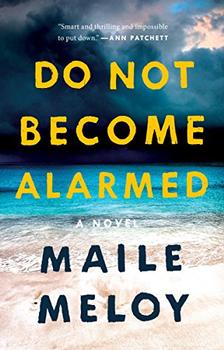Summary | Excerpt | Reading Guide | Reviews | Beyond the book | Read-Alikes | Genres & Themes | Author Bio

Critics' Opinion:
Readers' Opinion:
First Published:
Jun 2017, 352 pages
Paperback:
Jun 2018, 352 pages
 Book Reviewed by:
Book Reviewed by:
Norah Piehl
Buy This Book
Full disclosure: I've never had any desire to go on a cruise. I start getting antsy and claustrophobic after a two-hour harbor boat ride, so a multi-week Caribbean jaunt has always seemed deeply unappealing to me. But after reading the opening few chapters of Maile Meloy's new novel, I started having second thoughts. The tidy, efficient cabins, the food, the on-board exercise classes, the opportunity to sit and read while the children go to the "kids' club" – it all started to seem like a very sensible way to vacation.
That is, until about page thirty-five, when three families' dream vacations start to resemble a living nightmare. Two of the families are on vacation together – Liv, her husband Benjamin, and their kids, Penny and Sebastian, have decided to spend the Christmas holidays with Liv's cousin Nora, her husband Raymond, and their children, Marcus and June. As one (apparently) does aboard ship, they befriend an Argentine family with slightly older children, Isabel and Hector.
When the three families decide to take a day trip off ship – the men to play golf, the women and children to a zipline excursion – things quickly go horribly awry. Awakening from a beach nap, Liv discovers all the children are missing, swept away from the shore and downriver by an unseen current. By the time the adults find any evidence of the children, they are long gone, caught up in drug trade, violence, and rapidly mounting danger that is largely outside their control or understanding.
Meloy, who has written well-regarded books for both adults and young readers, divides her narrative into short chapters written from a variety of adult and child characters. Virtually every member of the three families has a chapter from his or her point of view, and several other supporting characters also have their voices heard over the course of the novel. In lesser hands, this technique could have felt like a writing exercise or parlor game, but Meloy adeptly utilizes this strategy to broaden the reader's perspective, build suspense, and weave a densely textured narrative that, in many ways, mirrors the chaos and confusion engulfing nearly every character at one point or another.
Although the country in which these events unfold remains nameless, Meloy also utilizes the American families' stories to comment either directly or obliquely on cultural differences and American privilege abroad. At one point, Raymond imagines that, although certainly not unscathed, "he and his family had escaped, leaving chaos behind them. It was the American way." This is contrasted with the ongoing morass of the locals whose lives unwillingly intersect with the American tourists and their children, as well as the repercussions for the Argentine family, whose suffering is possibly even more acute.
Most poignant is the contrast with an eight-year-old migrant, Noemi, whose path crosses the other children's when she is attempting to make a dangerous trek from Ecuador to New York City, where her parents reside illegally. The risk and danger of her family's predicament (and the implication that there are thousands like theirs) is subtly contrasted with the holiday-gone-awry drama of the American vacationers. Liv literally can't comprehend the circumstances that would lead parents to put their precious child in such danger: "Noemi's parents hadn't chosen the poverty and violence of the place they came from. They'd been trying to do the best thing for their kid. But to send a child illegally through all these countries – Liv couldn't imagine it."
Above all the uncertainty and desperation, the quickly collapsing façade of normalcy and the rise of chaos, what runs throughout the story is the idea that the act of becoming a parent irreversibly raises the stakes for emotional risk: "'To have a child is to open an account at the heartbreak bank,'" Liv recalls her younger self saying to her husband before they had children. Much later, she realizes just how true that statement is, but also recognizes that joy, and fear, and the prospect of heartbreak, are all tangled up in the mystery of parenthood and family life.
![]() This review was originally published in The BookBrowse Review in June 2017, and has been updated for the
June 2018 edition.
Click here to go to this issue.
This review was originally published in The BookBrowse Review in June 2017, and has been updated for the
June 2018 edition.
Click here to go to this issue.

If you liked Do Not Become Alarmed, try these:

by Chris Bohjalian
Published 2023
A luxurious African safari turns deadly for a Hollywood starlet and her entourage in this riveting historical thriller from the New York Times bestselling author of The Flight Attendant.

by Alexis Schaitkin
Published 2021
Hailed as a "marvel of a book" and "brilliant and unflinching," Alexis Schaitkin's stunning debut, Saint X, is a haunting portrait of grief, obsession, and the bond between two sisters never truly given the chance to know one another.




In youth we run into difficulties. In old age difficulties run into us
Click Here to find out who said this, as well as discovering other famous literary quotes!
Your guide toexceptional books
BookBrowse seeks out and recommends the best in contemporary fiction and nonfiction—books that not only engage and entertain but also deepen our understanding of ourselves and the world around us.